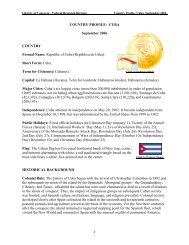1 - American Memory
1 - American Memory
1 - American Memory
You also want an ePaper? Increase the reach of your titles
YUMPU automatically turns print PDFs into web optimized ePapers that Google loves.
188<br />
ing on H.R. 7189, the proposed Hawaii and Western Islands Surface<br />
Commerce Protection Act, one of the most important bills involving<br />
Hawaii's interests since Hawaii became a State.<br />
You will recall that I testified at some length before the subcom-<br />
mittee in June of 1973 when opening hearings were held. I shall not<br />
take the subcommittee's time to reiterate what I said then, although<br />
nothing has diminished the urgency and need for the bill I expressed<br />
then.<br />
However, I do want to emphasize very briefly the importance of<br />
H.R. 7189 to the people of Hawaii. Since World War II Hawaii-west<br />
coast trade has been disrupted for a total of four years by shipping<br />
disputes of one type or another. The impact of these disruptions and<br />
distortions caused by anticipation of disruptions whether they actually<br />
occurred or not have caused economic, psychological and social hard-<br />
ship for the people of Hawaii. During the 1971-72 major west coast<br />
shipping strike which lasted 134 days Hawaii was truly hard hit.<br />
An independent analysis set the strictly economic cost at about $154<br />
million. Another estimat«d $93 million in price rises were avoided only<br />
because the initial strike period began during the wage-price freeze<br />
imposed by President Nixon. Unemployment increased substantially<br />
during the strike, from 5.4 percent to 7.2 percent. The loss of jobs<br />
directly attributed to the strike totaled 12.500, a substantial number<br />
in a state where only about 300,000 are employed.<br />
H.R. 7189 would eliminate human and economic costs like these.<br />
It would eliminate excessive warehousing costs at rates 250 percent<br />
of those on the mainland. It would ease the anxiety in the minds of<br />
almost a million <strong>American</strong>s residing in Hawaii and the western Pacific<br />
islands.<br />
Is H.R. 7189 antilabor? If it was, neither my colleague Mrs. Mink,<br />
jior I, nor Mr. Won Pat would have introduced it, for we are all gen-<br />
erally favorably predisposed toward the labor movement.<br />
Will H.R. 7189 infringe on the free, collective bargaining process,<br />
as both management and labor claim it will? The experience of the<br />
Sast would indicate the answer to this most important question to be a<br />
efinite "No."<br />
H.R. 7189 merely provides for the free flow of commerce between<br />
the west coast and Hawaii and the western Pacific islands during any<br />
shipping strike or lockout on the west coast for a period not to exceed<br />
160 days. To permit this, only 3 to 3.5 percent of the dock workers and<br />
7 percent of the shipboard workers would be involved. During the<br />
west coast dock strikes of 1971-72 all military cargo bound for Hawaii,<br />
the Pacific islands and Vietnam were allowed to go through. This re-<br />
quired 7 percent of longshore manpower and 14 percent of shipboard<br />
manpower to work during the strike, or double the manpower which<br />
would be required under H.R. 7189.<br />
In fact, as much as 40 percent of the manpower were engaged at one<br />
time or other at some ports in the handling of military cargo. But the<br />
strikes continued effectively and the collective bargaining process<br />
worked out its intended course. H.R. 7189 would involve only half the<br />
manpower then required and should not interfere with collective<br />
bargaining.<br />
I realize that organized labor has significant, good faith reservations<br />
about this bill and has banded it "antilabor." Management, too, opposes



![Albert Einstein Papers [finding aid]. Library of Congress. [PDF ...](https://img.yumpu.com/21604228/1/190x245/albert-einstein-papers-finding-aid-library-of-congress-pdf-.jpg?quality=85)





![American Colony in Jerusalem Collection [finding aid]. Library of ...](https://img.yumpu.com/17941275/1/190x245/american-colony-in-jerusalem-collection-finding-aid-library-of-.jpg?quality=85)



![Piccard Family Papers [finding aid]. - American Memory - Library of ...](https://img.yumpu.com/17941234/1/190x245/piccard-family-papers-finding-aid-american-memory-library-of-.jpg?quality=85)


